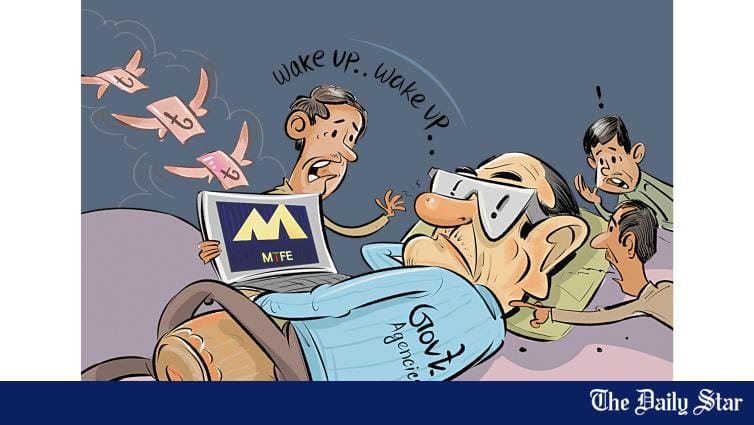No government agency is taking responsibility for the MTFE scam that has left thousands of Bangladeshis staring at catastrophic losses due to the murky nature of its operations.
Dubai-based app MTFE, short for Metaverse Foreign Exchange Group, enticed individuals in Nigeria, Sri Lanka and Bangladesh by branding itself as a Shariah-compliant platform for cryptocurrency, forex, commodities and stocks with unusually high returns on investments.
It gained popularity through a referral programme that gave existing users bonuses if they brought in others, working in essence as a Ponzi scheme.
So irresistible were the app’s money-making promises that thousands of people right down to the upazila or village level in Bangladesh poured crores into it.
On August 17, the Android app went under, freezing out the balances of hundreds of thousands of people everywhere.
The precise scale of the scam — that is the total financial losses and the number of affected individuals in Bangladesh — remains undetermined by any government agency as they are not sure under whose purview the overseas forex trading platform falls.
The nature of the MTFE scam falls outside the jurisdiction of the commerce ministry, said Commerce Secretary Tapan Kanti Ghosh.
“There isn’t any actual buying or selling taking place here like in e-commerce. It’s more akin to making money through depositing funds. Therefore, we do not exercise oversight over it,” he added.
And the law enforcement agencies have not received any complaint against the MTFE scammers as the investors were aware that they were involved in illicit activities through the app, Telecom Minister Mustafa Jabbar told The Daily Star.
“MTFE is just like a trap. People are not learning from history — this is a big challenge.”
— Md Masud Biswas Chief of Bangladesh Financial Intelligence Unit (BFIU)
The Directorate of National Consumers Rights Protection (DNCRP), the quasi-judicial government department responsible for hearing and addressing consumer complaints over goods and services, haven’t received any complaint either, according to its director general AHM Shafiquzzaman.
“Besides, DNCRP doesn’t deal with such things as the law doesn’t allow us. The Bangladesh Financial Intelligence Unit (BFIU) is tasked with overseeing it,” he added.
BFIU is a government agency of Bangladesh responsible for investigating money laundering, suspicious transactions and cash transaction reports. The unit works under the Bangladesh Bank.
Like Shafiquzzaman, Shyam Sunder Sikder, chairman of the Bangladesh Telecommunication Regulatory Commission (BTRC), shifted the responsibility on the central bank’s shoulders “since the issue of MTFE is related to financial transactions”.
If cryptocurrency was used, the central bank has to take responsibility for the MTFE scam, Jabbar said, adding that law enforcement agencies are tasked with monitoring crime on digital platforms too.
“Had they informed the BTRC, it would have acted against that platform. No one — conned customers, law enforcement agencies, BB — informed BTRC about it,” he added.
The central bank denied any responsibility.
“The Bangladesh Bank is not responsible for taking any measures concerning this matter,” said its spokesman Md Mezbaul Haque.
According to the law, the jurisdiction for addressing the matter of money laundering lies within the purview of BFIU, Haque said.
Over the past year, BFIU has been working with other law enforcement agencies to tackle online gambling, betting, foreign currency and crypto trading since the last year, said its chief Md Masud Biswas.
“We are always trying to raise awareness among people through advertisements in newspapers. The agency created a study group to reform gambling-related acts. We closed nearly one thousand apps, websites and YouTube links related to gambling through BTRC.”
However, he hasn’t said whether any specific steps have been taken regarding MTFE.
“MTFE is just like a trap. People are not learning from history — this is a big challenge,” he added.
Ghulam Rahman, president of the Consumers Association of Bangladesh, thinks although the greed of the people was instrumental in falling victim to this scam, the government has a responsibility to prevent such incidents.
“Whenever a crime is committed, the government should bring those perpetrators to book,” he added.
Abu Saeed Khan, senior policy fellow at LIRNEasia, echoed the same. “There was no social campaign to create awareness among the people about the risks of such investments,” he added.
As things stand, the Criminal Investigation Department has not initiated any formal investigation into MTFE as no formal complaint was received, said a top official on the condition of anonymity.
“But we have started a shadow investigation,” he added.
Another official of CID said they are collecting information and documents regarding the MTFE issue.
“The main responsibility of investigation and taking action falls on the central bank or BFIU since banking channels, mobile financial services and crypto were used in the scam,” he added.
(Partha Pratim Bhattacharjee and Md Mehedi Hasan contributed to the report)
Credit: Source link















































